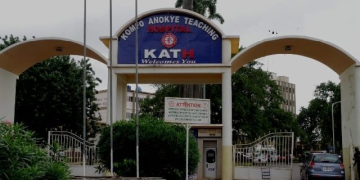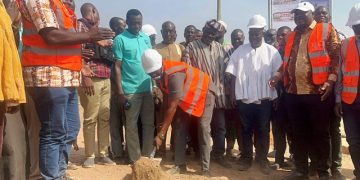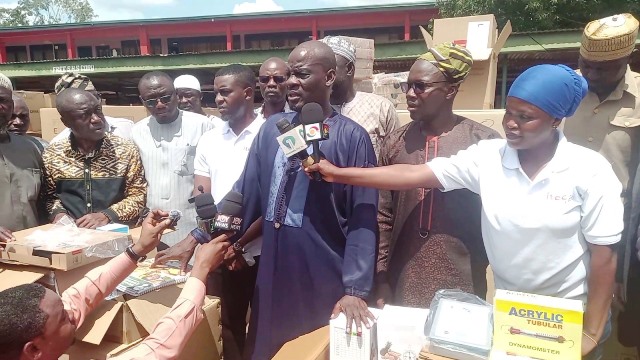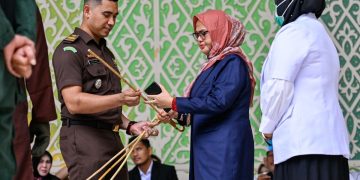The Minister for Education and Member of Parliament for Tamale South, Haruna Iddrisu, has officially announced the government’s intention to construct a Basic Science, Technology, Engineering, and Mathematics (B-STEM) facility in the Northern Region.
This development is part of a comprehensive effort to enhance foundational education across Ghana.
The announcement took place during a formal ceremony in Tamale, where the Minister also distributed B-STEM teaching and learning materials to the Northern Regional Directorate of the Ghana Education Service (GES) for further dissemination to selected basic schools in various districts.
This initiative underscores the government’s strategic commitment to strengthening STEM education at the fundamental level, aimed at establishing a robust foundation for science and technology education throughout the country.
During handing over of the equipment at the recent event, whilst addressed the stakeholders, Mr. Iddrisu reiterating the government’s commitment to enhancing infrastructure and ensuring the delivery of quality education from the foundational level.
He remarked, “We cannot wait until secondary or tertiary education to introduce our children to the tools of innovation. The B-STEM project represents our dedication to transforming science and mathematics instruction through practical, hands-on learning that inspires curiosity and fosters innovation.”
Upon its completion, the B-STEM facility will serve as a regional hub for science and technology training, providing students with access to modern laboratory equipment, robotics kits, coding tools, and interactive learning platforms. The Minister highlighted that the facility will be designed to support multiple districts and will function as a resource centre for both students and educators.
A £76 Million Investment in Basic Education
The B-STEM project is a £76 million partnership between the Government of Ghana and UK development cooperation agencies. This initiative aims to bridge the gap between theory and practice in Ghanaian classrooms by investing in science and math infrastructure, teacher training, and curriculum development.
 Minister Iddrisu stated that the Northern Region has been prioritized due to persistent disparities in access to quality science education, particularly at the basic level.
Minister Iddrisu stated that the Northern Region has been prioritized due to persistent disparities in access to quality science education, particularly at the basic level.
“For too long, our children in the Northern Region and other underserved areas have lacked access to the same resources available to their peers in other regions. This facility is a direct intervention to correct that imbalance,” he noted.
He also emphasized the long-term benefits of STEM education, including its potential to create entrepreneurial opportunities, enhance problem-solving skills, and prepare students for careers in high-demand sectors such as technology, engineering, and healthcare.
GES to Ensure Equitable Distribution
At the event, Alhassan Alidu Jnr., the Northern Regional Director of the Ghana Education Service, thanked the Ministry and development partners for supporting the region. He promised that the equipment would be shared fairly and used effectively.
“We will make sure the B-STEM kits go to the right schools and that our teachers receive training to use them in the curriculum. Our learners deserve the best, and we are dedicated to making this initiative successful,” he said.
Mr. Alidu Jnr. also requested ongoing support to improve teacher skills, especially in ICT, coding, and practical science teaching.
Community Stakeholders Welcome the Initiative
The announcement has been met with widespread optimism from education stakeholders, parents, and community leaders. Many view the B-STEM initiative as a transformative opportunity for the educational landscape in Northern Ghana.
Madam Amina Salifu, a headteacher at a basic school in the Sagnarigu Municipality, expressed that the project is both timely and long overdue. “For years, we have been teaching science solely from textbooks, with no practical materials available. This new approach will allow our students to see, touch, and engage with what they learn in class. It will inspire more girls and boys to take an interest in science and technology,” she remarked.
Future Projection Looking Ahead
As the government continues to implement the B-STEM project nationwide, there is growing anticipation regarding its long-term effects on educational outcomes and national development. Education experts believe that early exposure to science and technology will better equip students for both academic success and the rapidly evolving job market.
Minister Haruna Iddrisu emphasized that this initiative goes beyond just infrastructure; it signifies a broader shift in how Ghana approaches education in the digital age. “We are not only building facilities; we are nurturing minds. We want our children to imagine, invent, and innovate. That is the future we are preparing them for,” he concluded.
Construction of the B-STEM facility in the Northern Region is expected to begin in the coming months, with a completion target set for late 2026. Meanwhile, the distributed equipment is anticipated to establish a foundation for more engaging and effective STEM instruction in basic schools throughout the region.
Source: www.Kumasimail.com /Hoenyefia Noah Nash



































































